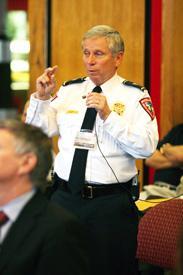The University held a tabletop train derailment exercise Tuesday where about 200 officials on campus discussed how they would respond in the event of a disaster situation.
Campus Police, executive officers, Facilities, University Housing, University Dining and Transportation were among the groups participating. Organizers presented a scenario where the derailment could have been a possible terrorist act and could have affected campus to the point where students needed to evacuate.
Brock Long, exercise designer from Beck Disaster Recovery and the facilitator for the drill, said his role was to direct everyone. He said he was pleased with the turnout.
“Anytime you can get this many people coming together in one exercise is very successful,” he said.
Long said there is always room for improvement and that participants exposed these issues during the “hot wash,” the debriefing of the drill where participants voiced concerns.
According to David Rainer, associate vice chancellor for environmental health and safety, the biggest challenge for any emergency would be communication.
“When all these things happen at once, how you get people to communicate and follow directions [is the focus],” Rainer said.
Rainer said during the drill, one break in communication was that the cell phones used for the purposes of the drill were not working in the chancellor’s office and therefore, it was more difficult for all the parties to communicate.
According to Tim Luckadoo, associate vice chancellor for student affairs, he felt the chancellor’s office directed the decision making to other groups.
“I didn’t get the impression that the chancellor and his immediate staff would be making that many decisions,” Luckadoo said.
Luckadoo said the chancellor and his office would be making bigger decisions, such as deciding to cancel classes and even though University Housing made that call during the drill, he said Housing can only suggest it in a real-life disaster.
“No one else [other than the chancellor’s office] has the ability to make that decision,” Luckadoo said.
Joanne Martin, director of client services at Beck Disaster Discovery, said the first responders seemed well-prepared.
“There was strong collaboration between Campus Police and the Wake County Emergency Management,” she said.
Rainer said Campus Police and Wake County participate in each others’ drills and in the case of a train derailment, the fire department would serve as the incident commander, but a representative from the fire department was not at the drill.
“When there’s an emergency that occurs … the Raleigh Fire Department and HazMat are in charge,” Rainer said.
According to Rainer, the University didn’t conduct an operational drill, in which an actual simulation is created, because they are “extremely disruptive and cost hundreds of thousands of dollars.”
Rainer said in the event that a derailment occurs, the goal is to inform all the proper channels with the same message of what is going to happen, and to use the University’s home page, hotline and broadcast capabilities to the University’s advantage. According to Martin, the print media would not be contacted.
The media was not allowed in Holladay Hall, according to Rainer, because they “wanted to put decision makers in one room” and have “free and frank discussion.”
All the groups referred “media” in the drill to News Services, according to Rainer, because there needs to be one focal point where people can get the same information. He also said the media would be able to go to press conferences and contact public information officers, but those were not set up during the drill because he said it was not a main objective.
Brock said the main strength of the drill was the participation of all groups.
“Everybody’s willing to participate and understand North Carolina State University can be the victim of an emergency,” he said.
Rainer said the University conducts drills on a variety of scales at least on an annual basis.








